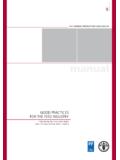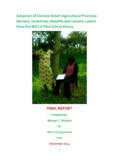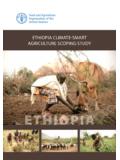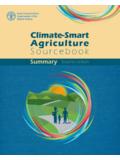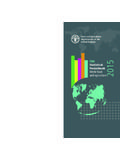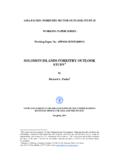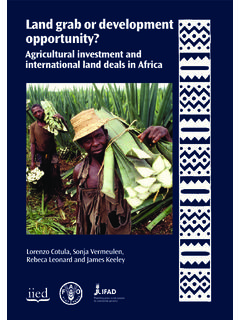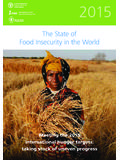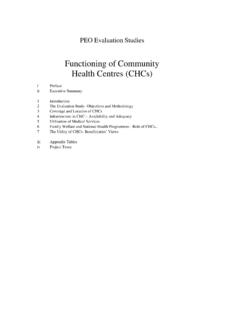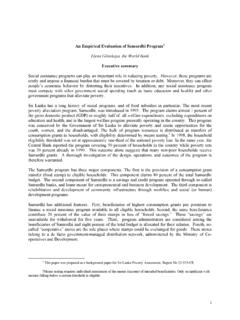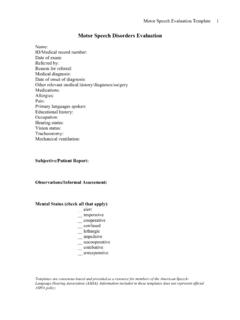Transcription of ROGRAMME OMMITTEE - fao.org
1 PC 103/5 March 2010 This document is printed in limited numbers to minimize the environmental impact of FAO's processes and contribute to climate neutrality. Delegates and observers are kindly requested to bring their copies to meetings and to avoid asking for additional copies. Most FAO meeting documents are available on the Internet at W0000 E PROGRAMME COMMITTEE Hundred and Third Session Rome, 12 16 April 2010 CHARTER FOR THE FAO OFFICE OF evaluation Summary Background The Immediate Plan of Action approved by the 35th Session of the FAO Conference in November 2008 specified that a comprehensive evaluation policy would be incorporated in a Charter for approval by the Council. This draft Charter responds to that requirement. After review by the Programme Committee, it will be referred to the Council for approval and incorporation in Volume II of the Basic Texts. The Committee has reviewed three successive draft versions of the Charter at its 100th Session1 in October 2008, 101st Session2 in May 2009, and 102nd Session3 in July 2009.
2 At its 137th Session in September 2009, the Council agreed that the Charter should not be finalized until the new Director of evaluation was recruited and could participate in the process. 4 Recent developments The new Director of evaluation was appointed effective 1 September 2009 and has participated in the process of reviewing the Charter. A new organizational structure was put in place effective 1 January 2010 with two Deputy Directors-General. Therefore, paragraph 39 of the draft Charter has been amended to reflect new arrangements for the chairmanship and composition of the evaluation Committee (Internal). Action requested The draft charter, incorporating proposed changes to paragraph 39, is provided for review by the Programme Committee and onforwarding to the Council for approval. 1 CL 135/5 paragraphs 25-29 2 CL 136/9 paragraphs 39-42 3 CL 137/3 paragraphs 38-39 4 CL 137 REP paragraph 31 PC 103/5 2 I.
3 evaluation in FAO 1. The FAO evaluation Service was established in 1968 to assure the effective operation of evaluation in the Organization. The evaluation function is one part of the oversight regime of FAO, which also includes external audit, internal audit, inspection and investigation. 2. evaluation provides accountability to member countries and to the Director-General. It gives member countries a more in-depth understanding and objective basis for their decisions in the governing bodies and for cooperation in the Organization s programmes. evaluation also contributes to corporate learning, feeding lessons into a robust feedback loop. evaluation provides a sound basis for improvements in the Organization s programmes in terms of their relevance to countries, definition of objectives, their design and implementation. FAO also participates in system-wide evaluation initiatives. Thus evaluation contributes to assessments of development effectiveness by the UN system.
4 3. All work of FAO financed from the regular budget of the Organization (mandatory assessed contributions) as well as that financed from voluntarily contributed extra-budgetary resources, is subject to evaluation . The policies for evaluation are set by member countries in the governing bodies. 4. evaluation is an integral element of a functioning results-based management (RBM) system. It provides accountability on results, in particular on outcomes and impacts of FAO s work. It informs the formulation of programmes, the definition of priorities and the arrangements to maximise institutional effectiveness. II. Purpose and Principles of evaluation A. DEFINITION OF evaluation 5. An evaluation is an an activity, project, programme, strategy, policy, topic, theme, sector, operational area, institutional performance, etc. It focuses on expected and achieved accomplishments, examining the results chain, processes, contextual factors and causality, in order to understand achievements or the lack thereof.
5 It aims at determining the relevance, impact, effectiveness, efficiency and sustainability of the interventions and contributions of the organizations of the UN system. An evaluation should provide evidence-based information that is credible, reliable and useful, enabling the timely incorporation of findings, recommendations and lessons into the decision-making processes of the organization and its members 5. B. PRINCIPLES OF evaluation 6. FAO strives for the highest international standards in its evaluation practice. It adheres to norms and standards established by the United Nations evaluation Group (UNEG)6. These norms and standards provide a benchmark against which all organizations and programmes of the UN 5 Adapted to become specific to FAO from the Norms for evaluation in the UN System , United Nations evaluation Group, 2005.
6 6 The United Nations evaluation Group (UNEG) is a professional network that brings together the units responsible for evaluation in the UN system including the specialised agencies, funds, programmes and affiliated organisations. UNEG currently has 43 such members. UNEG aims to strengthen the objectivity, effectiveness and visibility of the evaluation function across the UN system and to advocate the importance of evaluation for learning, decision making and accountability. UNEG provides a forum for members to share experiences and information, discuss the latest evaluation issues and promote simplification and harmonisation of reporting practices. PC 103/5 3 system can gauge their performance and aim to strengthen, professionalise and improve the quality of evaluation throughout the UN system. 7. The primary principles underpinning evaluation in FAO are: Independence, Impartiality, Credibility, Transparency and Usefulness.
7 These are inter-related. 8. Independence: Independence should be protected throughout the evaluation process: policy, institutional framework, management of the evaluation function, conduct of evaluations and follow-up. The evaluation function must be located in the Organization outside the line management that it is mandated to evaluate, and have a direct line of reporting to the governing bodies and the Director-General. In this way, it remains separate from those responsible for the design and implementation of the policies and operations that are evaluated. It must be free from undue influence by management through independent control of the financial and human resources allocated to evaluation , including independent performance assessment of evaluation staff. It must have freedom to design and conduct evaluations according to professional quality standards. 9. Impartiality: evaluation must be free from bias.
8 This means that evaluators must demonstrate professional and personal integrity and conflicts of interest must be avoided. Independence and quality of evaluation design are additional pre-requisites for impartiality. Evaluations must value the input of the main stakeholders, demonstrating a degree of empathy while at the same time maintaining intellectual rigour. Because no individual is totally impartial, evaluation teams must balance different perspectives and backgrounds. 10. Credibility: Evaluations must command a high degree of credibility, both from the governing bodies and from managers who must make and implement decisions. Besides impartiality and independence, the credibility of evaluation also requires that the team of evaluators has proven technical competence in the area under evaluation and its context as well as demonstrated competence in evaluation . Independent peer review of evaluation reports also reinforces their credibility.
9 11. Transparency: evaluation reports and management responses are in the public domain. Evaluations follow a consultative process, whereby evaluators and evaluation managers engage in dialogue to the maximum extent possible with main stakeholders throughout the evaluation process 12. Usefulness: Usefulness should always be a prime consideration for selection of a topic for evaluation . Evaluations will be most useful when addressing key areas of concern for the governing bodies and/or FAO management, especially when there are perceived to be problems, priorities are changing or if there are new opportunities. evaluation should be timed to fit into the management decision-making process. III. Types of evaluation in FAO 13. It is FAO policy that all the work carried out by the Organization is subject to evaluation , regardless of the source of funds, through three types of evaluation . 14.
10 Evaluations for the governing bodies are decided upon by the Council on the advice of the Programme Committee. Such evaluations focus on key elements of the results-based hierarchy, including strategic and functional objectives, impact focus areas, organizational results and core functions7. They also include thematic and programmatic studies and strategic partnership agreements. Major evaluations include all aspects of the work in the area covered, regardless of funding source, and deal with work at headquarters, regional and country levels. The 7 The Charter may need to be revised in the future, to take account of experience with Results-Based Management approaches and its implications for the Organization s evaluation programme. PC 103/5 4 programme of evaluations is defined in a rolling four-year plan. Criteria for selecting evaluations include: specific requests from the Programme Committee; requirements for evaluation expressed by the Director-General; and the need to achieve a balanced coverage of the Organization s strategies and priorities over the medium term.

